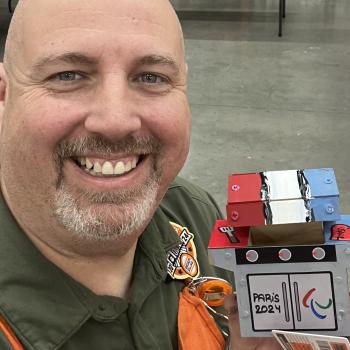
A “Worship Experiment” Article
Spiritual disciplines are essential to spiritual growth. Most can and should be practiced daily or weekly, but one discipline is dangerous and volatile. It’s rarely included in the literature on the topic.
Have you been taught how to have a quiet time? Quiet times are beautiful. They connect us with God. They are the rom-com movie of your spiritual life. They are the fireplace in your spiritual home.
Sometimes, however, in our spiritual lives, we need to chop wood to ear-splitting heavy metal music. Sometimes, we need to throw buckets of paint against a canvas without caring about the oversplash. Sometimes we need a loud time with God. In this article, let’s compare and contrast the two and go over some “how-tos.”
The Reality of Spiritual Disciplines
Spiritual disciplines were never intended to be a cosmic checklist of goodness to earn Almighty God’s attention. Instead, they are equivalent to the ways we spend quality time with a love interest or a child. When a couple is dating, they talk on the phone, text, share meals together, find quiet places to talk more intimately, and engage in physical displays of affection. Each person longs for the presence of the other. A parent seeking to build a relationship with a child invites the child into his or her world. They ride in the car. The parent listens to the child’s observations and teaches about deciduous trees or why yield signs are yellow. They tell each other stories, hug, and laugh.
The “loud time” doesn’t fit either of those analogies. It is more like calling in a trick play during a ball game while the crowd is deafening or opening up the Presidential “football” to get the nuclear launch codes.
The Classic Formula of a Quiet Time
When I have a quiet time, I’m most often in my bedroom closet, on the floor, wrapped in a blanket, wearing my bone-conducting headphones, and listening to this playlist.
Over my lifetime, I’ve learned these aspects of quiet time. Your list may vary wildly.
- Find a quiet and comfortable place where I will be undisturbed
- Take a few moments to escape all of the noise of life—work, family, distractions, the cell phone game I’m addicted to, etc.
- Turn on soft instrumental music.
- Pray and ask the Lord to show me who He is.
- Read (or listen to) two days in my daily Bible because I’m behind.
- Use pens or special highlighters to mark the text. Perhaps even use symbols from my custom Kay Arthur Bible legend to indicate themes such as spiritual growth, sin, or the attributes of God.
- Journal about what I’ve read indicating the author, context, intent, and more.
- Answer the question, “So what?” about the text. “If this is true, how should I respond?”
- Close with prayer following the ACTS model, being sure to spend more time on the Adoration, Confession, and Thanksgiving portions rather than the Supplication section. Include in my requests of the Lord a list from friends and family so that I’m praying for others more than yourself.
It’s a decent list. But more often than not, I don’t leave my closet feeling closer to the Lord. I leave feeling like I’ve done my duty. Sure, He meets me there, especially in prayer, but I often feel His presence more when I’m deep in thought on my commute or out of nowhere when I least expect it. However, I am convinced those moments wouldn’t occur, if I wasn’t regularly and purposefully going to Him in quiet time.
In contrast, I know for a fact He’s always present during my “loud times.”
The Background of a Loud Time
Think about the Psalms for a moment. What immediately comes to mind? Is it something like “The Lord is my shepherd” or “His delight is in the law of the Lord”? The following phrases—and hundreds more like them—are in the psalter, too.
- “If only you would slay the wicked, O God. Away from me, you bloodthirsty men!”
- “Why do the nations rage and the peoples plot in vain?”
- “Kill them not, lest my people forget; make them totter by your power and bring them down.”
David screams in prayer at God about the injustices he faces. He cries out to Him in fear about his enemies and oppressors. He howls in anguish about his doubts and struggles.
And we should follow this example, too. But the loud time isn’t just the screaming and wailing. It’s also what comes after.
Loud Times are Not Imprecatory Psalms
There are 14 Psalms where the writer cuts loose. David cranks the volume to eleven in Psalms 7, 35, 55, 58, 59, and 69, and 109. Asaph adds his own distortion on the guitar in Psalms 79 and 83. An unattributed writer gets in the action in Psalm 137. These are called the imprecatory psalms where the writer intentionally gets rude, angry, and hostile about his enemies. They are insults and almost curses.
I always smile when I hear a well-meaning Christian pastor or Bible teacher encourage the congregation to “pray the Scriptures.” My sinister brain goes, “Okay, I’ll pray the Scriptures for that person who irritates me. ‘May his days be few; may another take his office! May his children be fatherless and his wife a widow!’”
Let me be clear: what I do in those moments isn’t a loud time. I am twisting the Word of God to scratch an itch.
The imprecatory psalms may be a part of a loud time, but if we leave ourselves in anger alone, we will miss God.
When We Need to Practice a Loud Time
When is life the hardest and least logical for you? When do you find yourself exhausted and your patience extinguished? When does the enemy whisper treason in your ear? What are you most apt to doubt God? In those moments, consider a loud time.
In the last year, men in my band of brothers have experienced the following in addition to the regular rhythms of life:
- Loss of two jobs within the span of six months
- Surgery that didn’t heal quickly. Lots of pain and little sleep.
- The death of a parent.
- Losing a long season of sobriety.
- Moving a parent into the home who has deteriorating dementia. (His daily life includes cleaning up after bodily functions.)
- Estranged adult children.
Experiences like these call for loud times. When in the last year, did you go through deep waters?
How to Practice the Spiritual Discipline of Loud Time
The same formula present in some of the imprecatory psalms is also present in other psalms. For my example, I will use a favorite of many: Psalm 139. I’m sure I had read this psalm, but when Michael W. Smith recited it from memory during his “Big Picture” tour, I knew I needed to memorize it, too. Imagine my shock when I realized Smitty had left out a big portion of the prayer. He left out David’s loud time.
Psalm 139
- Praising and thanking God for His attributes (vv. 1–6)
- Acknowledging what God has done for you (vv. 7–18)
- Letting God know your full pain and dissatisfaction with life (vv. 19–22)
- Praying for the Lord to work inside you (vv. 23, 24)
Read it quickly for yourself. David lays out a great model for when we are ragged, torn, in the dark, and hurting.
A Loud Time Formula
Like any discipline, make it your own. They are not about form; they are about connecting with God.
- Acknowledge, even if through gritted teeth, who God is. Refer to a list of His attributes or names if you need to because you’re so blinded by pain.
- Thank God for at least one blessing you can remember. Look back in a journal if necessary.
- Lay out your case before the Lord and Creator of the Universe. Let it all fly. He has invited you as His adopted child and heir of the kingdom to come boldly to Him as Daddy (Abba). You don’t have to come to Him as Oliver Twist humbly asking a tyrant for a little more gruel. He can take your rage and pain because He already knows how you feel.
- Take a deep breath (Selah). Let your pulse rate go down a little.
- Ask God to work.
You’ll see the writers of the Psalms cut loose like this in many Psalms. The order isn’t always the same, but you’ll see all four attributes in place. (See just a few: 2, 3, 5, 7, 9, 10, 13, and 16.)
The Objections to and Benefits of Loud Times
I have heard three major objections to loud times. These actually reveal the power and benefits of practicing this discipline.
Loud times are irreverent.
“We should not be so cavalier with the Lord. We should always approach Him with respect and awe. We should be in fear of the Lord.”
The fear of the Lord is truly the beginning of wisdom. Clearly, the psalmist let God have it on numerous occasions. The disciples spoke to Jesus in ways that make me cringe. And Paul recounts stories of his displeasure with God. If these giants can do so, so can we.
Loud times are unhealthy for your emotional stability.
“If you become unhinged in the name of a spiritual discipline, you are merely practicing the behavior. Surely it will come out during your everyday life and cause harm to those you love. You might do so in the office and lose your livelihood.”
A loud time in the presence of the Ultimate Healer and “Author and Perfecter of our faith” will make us less likely to behave like Jim Carrey or the Tasmanian Devil outside of our prayer closets. We will receive healing and comfort from the One who loves us, not ostracization from those around us.
Loud times create a whiner, not a worshipper.
“If you rail at, cuss, curse, mock, demand from, and yell at God, you will fail to worship Him. You’ll become a cynic. You’ll lose your faith. You’ll decide that God is a punching bag.”
God doesn’t want us to be fake with Him. As David says in Psalm 139:
You know my sitting down and my rising up;
You understand my thought afar off.
You comprehend my path and my lying down,
And are acquainted with all my ways.
For there is not a word on my tongue,
But behold, O Lord, You know it altogether.
By being fake with God in the first place, we set ourselves up to doubt Him or segregate Him to a few approved places. We will actually allow the enemy to convince us God doesn’t care about our most significant hurts. If we share our crap with Him, He will meet us, draw us in, and pour salve on our wounds.
When Will You Practice?
Allow me to put two famous Brits in contrast with one another. C.S. Lewis writes in The Problem of Pain, “God whispers to us in our pleasures, speaks in our conscience, but shouts in our pains: it is his megaphone to rouse a deaf world.” If God is shouting at us in our pain to rouse us and have us turn to Him, the least we can do is respond with the extent of the pain. The goofy knight in “Monty Python and the Holy Grail” lost both arms and both legs and cried, “It’s only a flesh wound.” He denied his condition and brushed aside his reality.
When you are dying and feel crushed on all sides, practice a loud time. God is in the midst of your struggles. Meet Him there.













